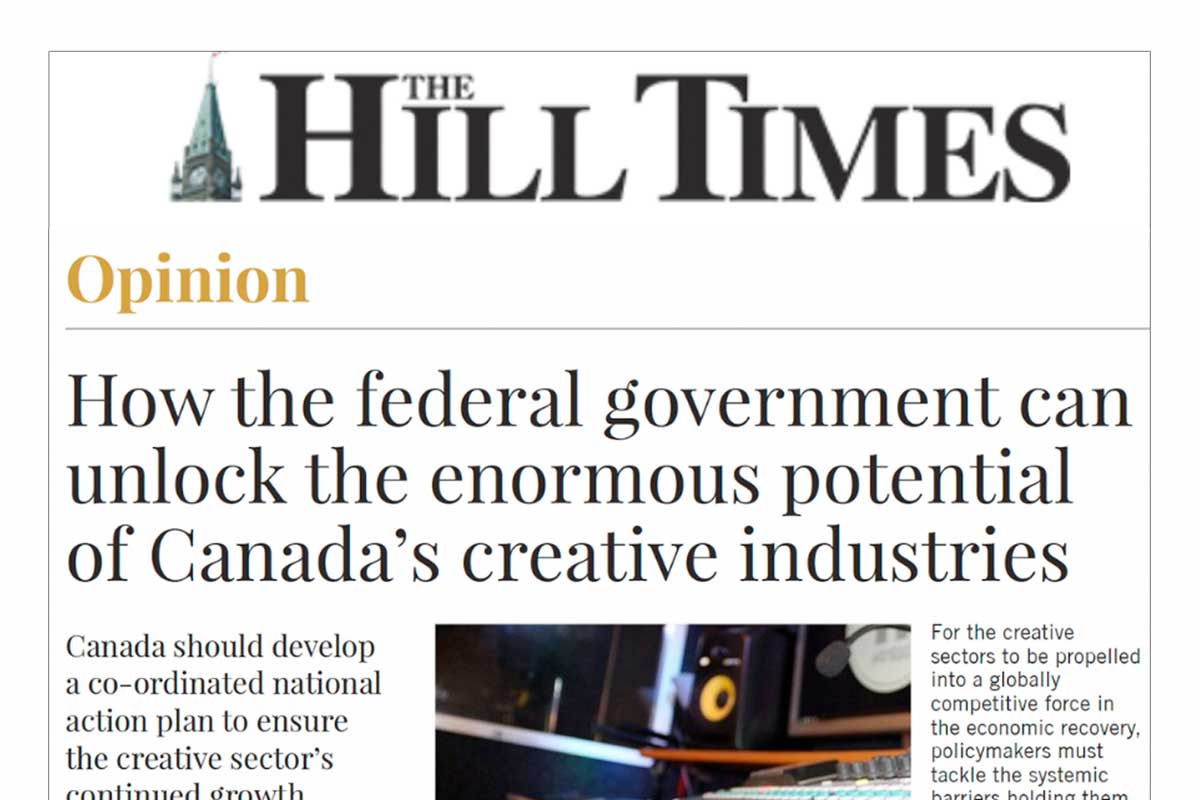By: Margaret McGuffin
September 22, 2021
Canada should develop a co-ordinated national action plan to ensure the creative sector’s continued growth.
TORONTO—Throughout this election campaign, Canada’s creative industries have heard the leaders of Canada’s major parties expressing support for our world-renowned and export-heavy sector.
And for good reason.
With the right policy levers and the support of the next federal government, our music, book, magazine, screen-based media, interactive media, broadcasting, performing arts, and digital sectors can not only thrive, they can reach new heights on the global stage.
Prior to the pandemic, our creative industries collectively accounted for $53.1-billion and three per cent of GDP and directly employed more than 666,500 Canadians, with countless spinoff jobs that significantly contributed to the economy.
For these sectors to be propelled into a globally competitive force in the economic recovery, policymakers must tackle the systemic barriers holding them back from reaching their full potential.
They must face issues related to taxation, innovative business models, workforce skills and labour, diversifying exports, and ensuring opportunities for systematically underrepresented voices, including those of women, Indigenous, and racialized groups. These issues fall outside the Department of Canadian Heritage, which is the primary department overseeing our creative industries.
We need a whole-of-government approach. The most effective, cost-efficient way to accomplish this is to bring together the federal government and private sector to develop a co-ordinated national action plan to ensure the sector’s continued growth.
World-class potential
Helping the small and large businesses that make up the sector fully participate in Canada’s recovery and capitalize on key opportunities abroad will help grow exports, make Canada globally competitive, and ensure our economy is diversified.
Indeed, governments around the world are increasingly recognizing the economic might and growth opportunities within the creative sector. And Canadian creative industries are a global success story. As a key Canadian economic sector with a large international client base, the continued growth of our creative exports is crucial to Canada’s economic recovery.
Our creative industries not only support Canadian culture and identity at home and abroad but also invest in creators and communities from coast to coast to coast.
What these industries desperately need now is to work together across government to set goals and look at tangible opportunities to evolve and propel global growth. It is critical that the government works collaboratively with industry so that government decision-making reflects the realities that industry faces on the ground and addresses the industry’s challenges.
The case for a new approach
The importance of a co-ordinated federal government approach in support of the creative sector is well established. The House Finance Committee recognized the sector would be well-served by a dedicated Economic Strategy Table on Creative Industries to “ensure sector growth and global competitiveness.” This would be similar to the other federally-commissioned public-private sector tables that developed cutting-edge plans for other sectors of the economy several years ago.
In its 2020 report, Canadian Ideas: Leveraging Our Strengths, the committee recommended that the government “urgently assemble an Economic Strategy Table on Creative Industries to unlock the full innovative potential of these sectors, produce world-class content, and share its creative works both at home and abroad.”
In 2018, the Economic Strategy Table on Digital Industries also called for “the creation of a dedicated creative industries forum” in order to “fully capture the potential of Canadian creative firms.” It added: the strength of Canada’s creative industries “could become a massive competitive advantage for Canada.”
Low-cost, high-reward
The government could quickly convene a roundtable or a forum of creative industry leaders to ensure these key Canadian sectors don’t lose their unique skills, that they can drive innovative growth, and that underrepresented groups can access the same opportunities to showcase their world on the world stage.
This would be low-cost and high-reward. It would show the businesses in Canada’s creative industries that the federal government supports the sector and is committed to helping it unlock its full innovative potential both at home and abroad. It would also guarantee that all stakeholders are working together to identify opportunities, examine barriers to growth, and pinpoint needed government support and solutions.
As Canada’s creative industries prepare for the post-pandemic period, there is no better time to move ahead with this initiative. It would ensure all the right eyes are on the needs of the sector, and lead to a co-ordinated, forward-looking set of policies to help our creative industries not only bounce back, but also thrive in a post-pandemic world.
Margaret McGuffin is the chief executive officer of Music Publishers Canada. She is also the chair of the board at WorkInCulture and a member of the MusiCounts advisory board.
The Hill Times



